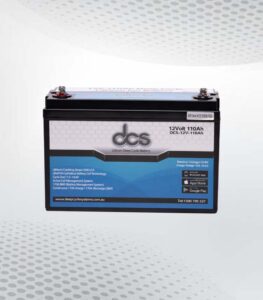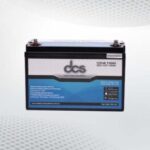In the rapidly evolving landscape of renewable energy and sustainable solutions, the 120ah lithium battery emerges as a game-changer, revolutionising the way we store and manage power. Its unique combination of efficiency, durability, and versatility makes it an indispensable asset for various applications, from powering off-grid homes to fuelling long-haul electric vehicles. With a capacity to hold an impressive amount of energy, the 120-ah lithium battery is setting new standards for what we can expect from energy storage technologies.
Understanding The Basics Of The 120-ah lithium battery
A 120-ah lithium battery stands as a formidable force in the realm of high-capacity energy storage solutions, distinguished by its ability to deliver 120 amperes of current for an hour. This measurement, known as ampere-hour (Ah), is pivotal in gauging a battery’s energy storage capacity. Central to the operational superiority of these batteries is the utilisation of lithium ions – a move away from conventional lead-acid batteries. This shift not only brings forth a significant uptick in energy density but also ensures quicker recharging cycles and a markedly reduced rate of self-discharge.
The Advantages Of Opting For 120 Ah Lithium Battery
Selecting a 120 ah lithium battery presents a suite of advantages that are integral to enhancing both performance and efficiency in energy storage systems. The superior energy density of these batteries enables them to store a greater amount of energy in a comparatively compact and lightweight form factor. This characteristic is especially beneficial in applications where space conservation and ease of mobility are paramount.
Furthermore, these batteries boast an extended service life, capable of withstanding thousands of charging cycles with minimal loss in capacity. This resilience to frequent charge and discharge cycles significantly reduces the need for replacements, contributing to both cost savings and environmental sustainability.
In addition, 120Ah lithium batteries are designed to be virtually maintenance-free, eliminating the regular upkeep required by traditional battery technologies. Their robustness against high temperatures and superior efficiency further fortify their position as a prudent choice for a broad range of applications. Embracing a 120-ah lithium battery not only meets the immediate needs of energy storage but also aligns with future-focused, eco-conscious energy management strategies.
Diverse Applications Of Lithium 120ah Battery
The scope of applications for lithium 120ah battery is remarkably broad, highlighting their adaptability across various sectors. In the realm of transport, they are a cornerstone for electric vehicles (EVs), where they provide the necessary stamina for longer journeys without frequent recharging. For homes that depend on solar power, these batteries are indispensable, storing energy collected during the day for use when the sun goes down, ensuring a constant power supply.
Additionally, they find utility in recreational vehicles (RVs) and marine vessels, where their compact size and lightweight nature are crucial for space-efficient and reliable energy storage. Beyond leisure, these batteries serve critical roles in portable power stations and emergency backup systems, offering resilience and reliability in scenarios where power supply can be unpredictable.
Installation Tips For Maximising Battery Performance
For optimal performance of a 120-ah lithium battery, securing a correct installation is imperative. It is advisable to position the battery in a location where it is shielded from extreme temperatures to avoid performance degradation. Utilising a charging apparatus that is specifically tailored to the unique requirements of lithium-ion batteries will ensure that charging is both efficient and conducive to prolonging the life of the battery.
It is essential to incorporate a Battery Management System (BMS) which acts as a safeguard, monitoring the battery’s state and intervening to prevent issues such as overcharging, deep discharge, and potential short circuits. This proactive approach not only boosts the battery’s performance but also significantly enhances its safety profile. Adhering to these guidelines will assist in maximising the utility and longevity of the battery, ensuring it delivers consistent and reliable power across its lifespan.
Maintenance Practices To Ensure Longevity
Maintaining the health and enduring performance of a 120-ah lithium battery involves several straightforward yet effective practices.
- Conduct periodic inspections to ensure all connections are secure and free from corrosion, which can compromise conductivity and battery efficiency.
- Keeping the battery’s surface clean from dust and debris avoids unwanted build-up that could potentially impede its functionality.
- It is also essential to store the battery in a location that remains cool and shielded from direct sunlight to prevent overheating and prolong its operational life.
- Moderation in charging practices is advisable; avoid allowing the battery to deplete fully before recharging and refrain from keeping it at maximum charge for prolonged periods.
- Such measures not only help in preserving the battery’s optimum capacity but also safeguard against the degradation of its internal components, ensuring that the 120-ah lithium battery continues to provide dependable energy storage without compromising on performance.
Navigating The Cost-Benefit Analysis
Whilst the initial purchase price of a 120-ah lithium battery may be at the higher end of the spectrum in comparison to traditional lead-acid batteries, it’s essential to delve deeper into the financial dynamics over the battery’s lifecycle. The unparalleled efficiency, significantly longer lifespan and minimal maintenance needs of these lithium batteries carve out a path for substantial cost savings in the long run.
Moreover, their robust performance and reliability can lead to lower operational costs, especially in critical applications where energy dependability is paramount. It is also worth considering the environmental angle; the extended life and reduced waste contribute to a greener footprint, potentially offering savings in disposal costs and environmental compliance.
Understanding Safety Features And Protocols
When it comes to high-capacity lithium batteries like the 120Ah variant, safety is a critical consideration. These batteries are engineered with several integral safety mechanisms to address potential risks effectively. Among these are pressure relief valves, which serve to release excess pressure and prevent the battery from rupturing in cases of abnormal pressure build-up.
Thermal fuses are another crucial feature, designed to interrupt the electrical circuit if the battery temperature exceeds safe limits, thus averting thermal runaway—a condition where the battery could potentially catch fire or explode. It is imperative for users to adhere strictly to the manufacturer’s guidelines concerning charging, installation, and general handling to ensure these safety features function as intended.
Investing in high-quality charging infrastructure and a robust Battery Management System (BMS) offers additional safeguards, closely monitoring the battery’s condition to preemptively address issues like overcharging and deep discharges. By understanding and respecting these safety protocols and features, users can significantly mitigate the risks associated with operating high-capacity lithium batteries, ensuring a safer usage environment.
Future Trends & Innovations In Lithium Battery Technology
The horizon of lithium battery technology is witnessing a surge in innovative breakthroughs that promise to redefine energy storage capabilities. Among the forefront of these developments are solid-state batteries, which are poised to significantly enhance safety and energy density, thereby setting a new benchmark for efficiency and reliability. This technology eliminates the liquid electrolyte, replacing it with a solid counterpart that is less prone to leaking and thermal runaway, thus heralding a safer energy storage solution.
Additionally, advancements in electrode materials are being rigorously pursued, with researchers exploring options like silicon and lithium metal that offer the potential for higher capacity and faster charging rates. These innovations are not merely incremental improvements but represent a quantum leap forward in our pursuit of sustainable energy solutions.
They hold the promise of extending the applicability of lithium batteries, including the 120Ah variants, across a broader array of sectors, further cementing their role in powering the future of technology and transportation. As we move forward, the emphasis on integrating renewable energy sources with highly efficient storage solutions like lithium batteries becomes ever more critical, driving the momentum towards a greener, more sustainable energy landscape.
Efficiency Boosting Features Of 120Ah Lithium Batteries
The efficiency of 120Ah lithium batteries is markedly enhanced by several pivotal features. These batteries excel in maintaining stable voltage levels even under varied load conditions, which is crucial for the optimal functioning of powered equipment. Their rapid charging capability is another hallmark, significantly reducing the time required to reach full capacity and thus ensuring devices remain operational with minimal downtime.
Additionally, the low self-discharge rates of these batteries are a notable advantage, as they can retain a majority of their stored energy over time when not in use, making them ideally suited for both regular operation and standby purposes. This characteristic is particularly beneficial in scenarios where batteries may not be regularly discharged and recharged, such as in emergency power supplies or seasonal usage equipment.
Longevity Of 120Ah Lithium Batteries
The durability of 120Ah lithium batteries is a crucial attribute that underpins their appeal. These batteries are engineered for endurance, boasting a lifespan that can extend beyond a decade when maintained correctly. Such longevity is attributed to the lithium-ion chemistry that powers these units, known for its resilience against the typical wear that plagues other battery types. Adherence to optimal usage, storage, and maintenance guidelines is key to unlocking the full lifespan of these batteries.
This involves avoiding extreme depletion before recharging, steering clear of prolonged exposure to high temperatures, and ensuring that the battery is kept clean and connections are secure. These measures collectively play a pivotal role in preserving the battery’s integrity and performance over time. By investing in a 120-ah lithium battery, users are securing a reliable energy storage solution that promises sustained performance over an impressive duration, reinforcing its value proposition in a myriad of applications.
FAQs
1. Can I use a 120ah lithium battery in my existing system designed for lead-acid batteries?
Yes, you can often use a 120ah lithium battery as a replacement for lead-acid batteries, but it’s important to check compatibility. Lithium batteries have different charging requirements and voltages, so you may need to upgrade your charger or controller to ensure optimal performance and safety.
2. How do I properly dispose of or recycle a 120ah lithium battery at the end of its life?
Recycling lithium batteries is crucial due to their composition and potential environmental impact. You should never dispose of them in household waste. Many retailers and local waste management facilities offer recycling services specifically for lithium batteries. Contact your local services to find the most appropriate disposal or recycling option available.
3. Is it safe to leave my 120ah lithium battery charging overnight?
While 120Ah lithium batteries are designed with safety in mind, including protection against overcharging, it’s advisable to use a charger with an automatic cut-off feature. This ensures the battery stops charging once full, reducing any risk of overheating or damage, and preserving the battery’s lifespan. Always follow the manufacturer’s guidelines for charging practices.
 Conclusion
Conclusion
120ah lithium battery unparalleled efficiency, durability, and versatility underscore its critical role in powering a diverse array of applications, from electric vehicles to renewable energy systems. The benefits of these batteries, including their compact size, lighter weight, and extended lifespan, not only offer practical advantages but also align with the broader goals of sustainability and environmental stewardship. As we look towards a future where the demand for reliable and eco-friendly energy solutions is ever-increasing, the 120-ah lithium battery represents a beacon of innovation. It is a pivotal component in our journey towards a more sustainable and energy-efficient world.
| Other Good Articles to Read |
| Blogs-Nation |
| Blogs-Peoples |
| Bryan Smith Blogs |
| intellect blogs |
| the fault in our blogs |
| blogs eu |
| oz forums |
| recruitment blogs |
| zet blogs |
| id blogs |
| Blog Studio legale |
| blogs map |
| Related Business Listings |
| Directory Submissions |
| Regional Directory |



